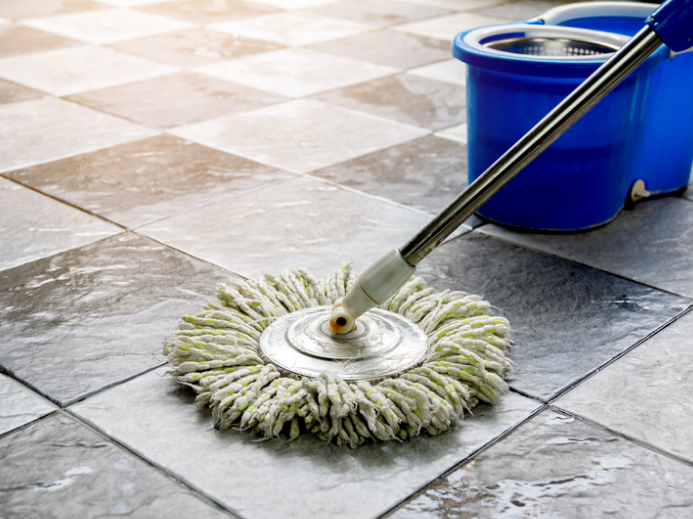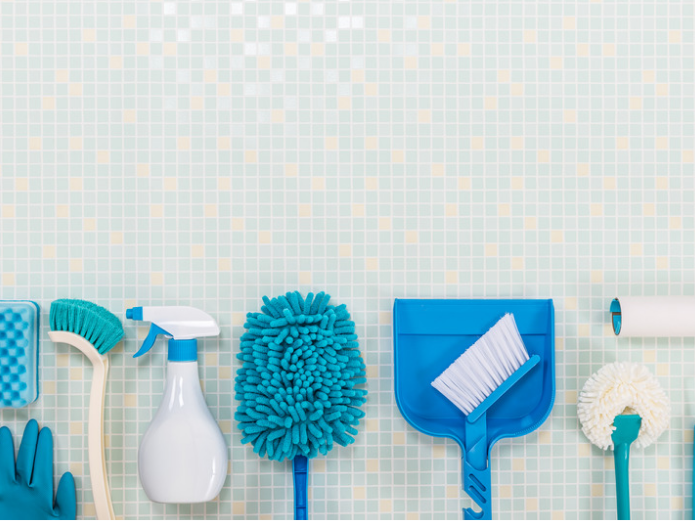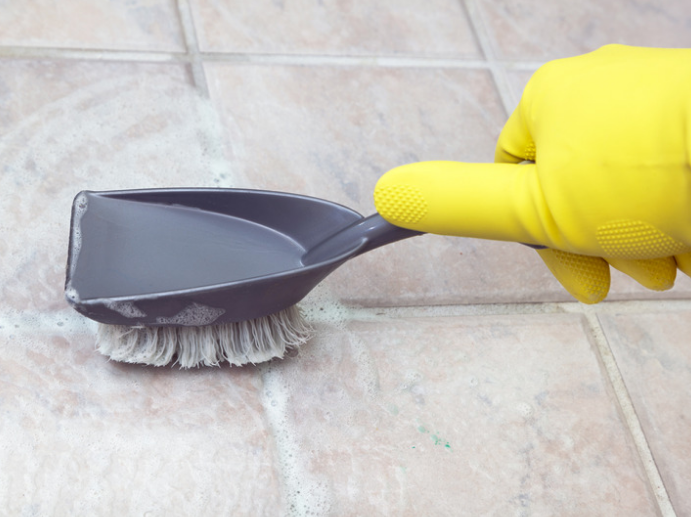If you love tile flooring, then you are not alone. We are in the same boat! Tiles are strong, aesthetically pleasing, and can be inexpensive. While porcelain and ceramic tile floors have many benefits, a lot of people will agree the best one is how simple it is to keep them clean.
Once you know how to maintain tile floors properly, you can do it with little effort. But what’s the best method to clean tile floors? Fret not, as we are going to walk you through it.
Tiles can be kept spotless for years by cleaning them with warm water, a chamois mop, a cleaning solution, a little soap, and a towel. You can follow the instructions and information below to clean porcelain and ceramic tiles. So, without any further ado, let’s get started.
How to Clean Ceramic Tile Floors
When it comes to beauty, adaptability, and durability, ceramic tile is difficult to beat. Ceramic tile is perfect for high-traffic areas like entranceways and is used for countertops, backsplashes, and other places. With the right tools and information, it's simple to understand how to clean ceramic tile floors.
To avoid abrasive debris and dirt accumulation, you should sweep the ceramic tiles daily. Weekly tile cleaning is recommended but do pick your mop carefully. The plastic and metal components of sponge mops and different conventional mop substitutes have the potential to harm ceramic tile. Use a string or strip mop rather than the fancy sponge mops if you want to learn how to clean ceramic tile floors like a master.
Here’s how you can easily clean your ceramic tile floors:
- Utilize a mop, hot water, and a few tablespoons of dish soap to clean the floor
- If necessary, clean the grout with white vinegar or an old toothbrush
- Spill off the dirty water and get a new bucket of clean hot water to sweep away the soapy residue
- To achieve the most incredible finish, frequently ring out the mop
- Enjoy your brand-new tile floor while it dries naturally
It is much simpler to keep your ceramic looking its best week after week if you are familiar with quick methods for cleaning tile floors. It will be much simpler for you to maintain a tile floor if you immediately clean up any mud, spills, or debris that you find on it.
Even if you are an expert tile cleaner, dirt and dust can cause ceramic tile to lose its luster over time, regardless of how well you keep it clean. After the tile has been washed and allowed to dry, you can bring back its shine by rubbing it with a microfiber towel.
How to Clean Porcelain Tile Floors
Your kitchen will gleam once more if you know how to clean porcelain floor tiles. Porcelain is the perfect material for traditional and modern kitchens and bathrooms since it is resistant to years of use, grease stains, and stains. Because porcelain tile is more durable than ceramic tile, you can use more force while cleaning if you need to remove grease and filth.
Porcelain floors should also be regularly swept to reduce the amount of dust and grime. Invest in a nice broom and take pleasure in the simple labor. Periodic sweeping is typically all that's required to keep porcelain sparkling. Use the mop you regularly use to clean the porcelain tile floors thoroughly. By doing that, you won't need to worry excessively about scratching.

Here are some tips for keeping your porcelain tiles clean and fresh:
Regularly dry out your mop after mopping the floor
Combine distilled white vinegar and hot water in a bucket for cleaning
Using a mop and hot, clean water, rinse the floor
Use baking soda and an old toothbrush to clean dirty grout
It is best to clear up any messes on the floor as soon as they occur rather than putting it off. Maintain the shine of your porcelain tile floor by buffing it frequently with a mop made of microfiber. Dust may be easily removed, and the floor's gorgeous lustre can be restored, both with a microfiber mop.
How to Clean Floors with Stone Tiles

What if you don’t have ceramic or porcelain tiles? Instead, have stone tiles? In such a case, you must exercise caution when dealing with natural stone tiles, such as granite, slate, or marble. The chemicals can harm the surface of these tiles in conventional cleaners. Instead, use cleansers designed especially for natural stone to care for your stone tiles.
Marble Tiles
Marble makes beautiful tiles, but it requires a lot of upkeep. Never use anything with an acidic PH level to clean marble tile. Lemon and vinegar-based cleaners should be avoided because they may etch the tile's surface. Additionally, avoid using anything that could harm the marble, like scouring powders or brushes with firm bristles.
Slate Tiles
You are able to clean slate tiles with a mild detergent as long as the detergent does not contain any acidic elements such as lemon or vinegar. In order to avoid water stains, make sure that any coated slate tiles you have are dried off as quickly as possible with a microfiber towel.
Granite Tiles
Granite tile should be treated with a mild, pH-neutral detergent like marble and slate tile. Using a strong cleaner runs the danger of staining or leaving streaks on the tile. To maintain a glossy granite floor looking neat and polished, you may also buff it.
How frequently should tile floors be cleaned?
Now that you know how to clean tile floors, you must wonder how often you should clean them. We suggest a regular cleaning routine that includes dry and wet cleaning to keep your tile clean and residue-free.
Dry clean at least once a week, or whenever you can see (or feel) debris with a vacuum or sweep the area. Any type of tile floor can be cleaned with a soft-bristle vacuum attachment, but it might be challenging to maneuver it into corners or small places. To complete the task, use a dustpan and hand broom.
Mop the tiles in your kitchen once every two weeks and the tiles in your bathroom once a week as germs grow fast in bathrooms. Once every few months, or whenever it starts to look dirty, give your grout a spot cleaning.
Tips To Deep Clean Tile Floors

Tile flooring requires frequent cleaning if you want it to have a dazzling appearance and resist accumulation of contaminants. Because there are now cutting-edge, very effective cleaning chemicals available in many stores, maintaining and keeping tiles clean is no longer a big concern.
A few pointers to keep in mind if you want to have shiny, clean tile flooring:
- Cleaning tiles regularly saves effort, time, and money by eliminating the need for flooring scouring and harsh chemicals. To keep the tiles clean and shiny, look out for any oil spills, especially in the kitchen and dining areas, and clean them frequently.
- Instead of using sponges, use a chamois-style mop and warm water with a few drops of detergent for improved outcomes and gloss after cleaning.
- The edges of tiles gather food crumbs, sand, and other material, giving them a drab appearance despite the fact that they are frequently dust-resistant. Therefore, sweeping and vacuuming are thought of as routine.
- Tile flooring comes in two varieties: glazed and unglazed. Glazed floors have a thick surface and a shiny appearance; if the incorrect cleaning agents are applied, the flooring might become obtuse. Therefore, mild cleaning agents like vinegar or lemon and warm water work best for glazed tiles.
- On the other hand, unglazed tile floorings are porous and quickly gather stains and dirt. Cleaning consequently becomes difficult. Effective cleaning chemicals are required to clean them.
- Additionally, you can use a soft, dry cloth to wipe away extra liquids. Additionally, this gives your flooring a fantastic sheen.
Professional Cleaning Companies
If you can’t get rid of the dirty floor look, we recommend calling a certified cleaning company to clean your tile flooring and grout joints. Their equipment can reach over 200 degrees and with water pressure of 1,000psi to remove the dirt ingrained into the grout and tile. At-home remedies and rentals simply are not capable of reaching those temperatures and power.
To Wrap Up
Even though many different flooring alternatives are available on the market, tile flooring is one of the most popular choices because it only requires regular upkeep. Suppose you also have ceramic, porcelain, or natural stone tiles in your kitchen, bathroom, or backsplash. In that case, you should adhere to the instructions given previously to clean them in a manner comparable to that of a trained expert. In addition, there are a few strategies and procedures that will keep it shiny and glossy regardless of the kind of tile you have.

